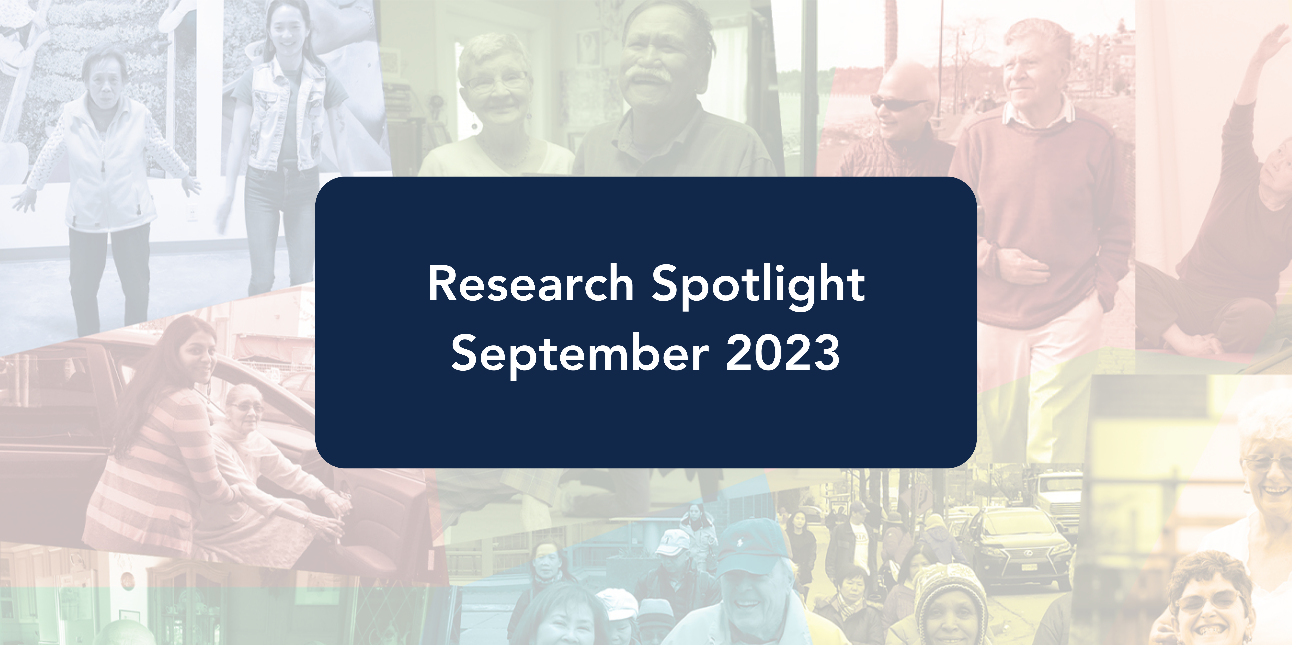Healthy Aging CORE Research Spotlight: September 2023

Research Spotlight: National Collaborating Centre for Indigenous Health
The National Collaborating Centre for Indigenous Health (NCCIH) is a national Indigenous organization established in 2005 by the Government of Canada and funded through the Public Health Agency of Canada to support First Nations, Inuit, and Métis public health renewal and health equity through knowledge translation and exchange. The NCCIH fosters links between evidence, knowledge, practice and policy while advancing self-determination and Indigenous knowledge in support of optimal health and well-being. When developing reports, fact sheets, and other knowledge sharing materials NCCIH materials undergo a rigorous double-blind peer review process that includes both academic as well as community expertise.
Below are some examples of NCCIH resources relevant to healthy aging:
- Report: Improving access to mental health and addictions services and supports for older Indigenous adults, using a cultural safety and equity lens
- Report: Alzheimer’s Disease and Related Dementias in Indigenous Populations: Knowledge, Needs, and Gaps
- Video: Indigenous Food Sovereignty
- Podcast: Climate change and Indigenous Peoples’ Health in Canada
New Research Reports on CORE
- Urban Aboriginal Knowledge Network (UAKN) Compendium: Research For A Better Life [David Newhouse, Verlé Harrop, Kevin Fitzmaurice, UAKN Secretariat]
New Journal Articles
Open Access Articles
Articles that are free and accessible to the general public.
Gonzalez, M., Steinberg, R. I., Bruce, F., Ullrich, J. S., & Walls, M. L. (2023). Indigenous Elders' Conceptualization of Wellbeing: An Anishinaabe Worldview Perspective. International Journal of Indigenous Health, 18(1). https://doi.org/10.32799/ijih.v18i1.39518
In this article Gonzalez and colleagues report on their findings from 9 semi-structured interviews conducted with Elders in the Anishinaabe language. Based on the perspectives of the Elders the authors present a model that aims to broaden understanding of Indigenous health and well-being. The Elders conceptualized well-being as a complex and interrelated system grounded in spiritual connectedness, which is guided by Anishinaabe language and ways of life. The importance of environmental connectedness and community connectedness were also emphasized.
Graham, S., Muir, N. M., Formsma, J. W., & Smylie, J. (2023). First Nations, Inuit and Métis Peoples Living in Urban Areas of Canada and Their Access to Healthcare: A Systematic Review. International Journal of Environmental Research and Public Health, 20(11), 5956.
In this systematic review Graham and colleagues reviewed 41 studies published between 1981 and 2020 on barriers or facilitators of health service access for Indigenous peoples in urban areas. Barriers included communication difficulties with health professionals, medication issues, dismissal by healthcare staff, wait times, mistrust of the healthcare system, racial discrimination, poverty and transportation issues. Facilitators included access to culture, traditional healing, Indigenous-led health services and cultural safety.
Sydora, B. C., Listener, L., Kung, J. Y., Ross, S., & Voyageur, C. (2023). Traditional crafting as a catalyst for Indigenous women’s intergenerational cohesion and wellness: a Canadian perspective. International Journal of Circumpolar Health, 82(1), 2175763.
This literature review explores the role of Indigenous crafting in transferring traditional and cultural teachings from female relatives and Elders to girls and younger women. Sydora and colleagues summarize the findings of 12 relevant publications. The literature suggests that engaging in traditional crafting inspires pride in Indigenous identity, has the potential to increase intergenerational cohesion, can boost wellness, and aid in healing from trauma.
-
Date
Sep 26, 2023
-
By
Healthy Aging
